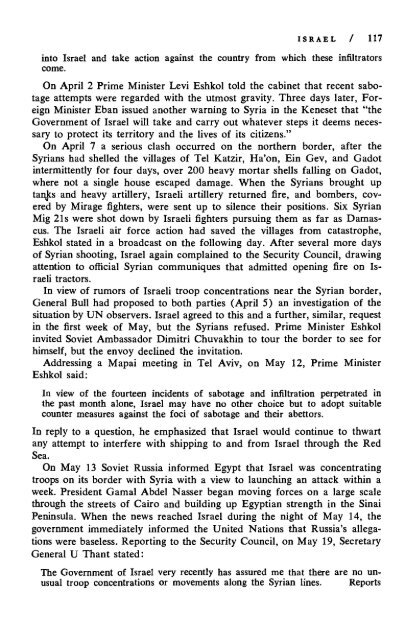1968_4_arabisraelwar
Create successful ePaper yourself
Turn your PDF publications into a flip-book with our unique Google optimized e-Paper software.
ISRAEL / 117<br />
into Israel and take action against the country from which these infiltrators<br />
come.<br />
On April 2 Prime Minister Levi Eshkol told the cabinet that recent sabotage<br />
attempts were regarded with the utmost gravity. Three days later, Foreign<br />
Minister Eban issued another warning to Syria in the Keneset that "the<br />
Government of Israel will take and carry out whatever steps it deems necessary<br />
to protect its territory and the lives of its citizens."<br />
On April 7 a serious clash occurred on the northern border, after the<br />
Syrians had shelled the villages of Tel Katzir, Ha'on, Ein Gev, and Gadot<br />
intermittently for four days, over 200 heavy mortar shells falling on Gadot,<br />
where not a single house escaped damage. When the Syrians brought up<br />
tanks and heavy artillery, Israeli artillery returned fire, and bombers, covered<br />
by Mirage fighters, were sent up to silence their positions. Six Syrian<br />
Mig 21s were shot down by Israeli fighters pursuing them as far as Damascus.<br />
The Israeli air force action had saved the villages from catastrophe,<br />
Eshkol stated in a broadcast on the following day. After several more days<br />
of Syrian shooting, Israel again complained to the Security Council, drawing<br />
attention to official Syrian communiques that admitted opening fire on Israeli<br />
tractors.<br />
In view of rumors of Israeli troop concentrations near the Syrian border,<br />
General Bull had proposed to both parties (April 5) an investigation of the<br />
situation by UN observers. Israel agreed to this and a further, similar, request<br />
in the first week of May, but the Syrians refused. Prime Minister Eshkol<br />
invited Soviet Ambassador Dimitri Chuvakhin to tour the border to see for<br />
himself, but the envoy declined the invitation.<br />
Addressing a Mapai meeting in Tel Aviv, on May 12, Prime Minister<br />
Eshkol said:<br />
In view of the fourteen incidents of sabotage and infiltration perpetrated in<br />
the past month alone, Israel may have no other choice but to adopt suitable<br />
counter measures against the foci of sabotage and their abettors.<br />
In reply to a question, he emphasized that Israel would continue to thwart<br />
any attempt to interfere with shipping to and from Israel through the Red<br />
Sea.<br />
On May 13 Soviet Russia informed Egypt that Israel was concentrating<br />
troops on its border with Syria with a view to launching an attack within a<br />
week. President Gamal Abdel Nasser began moving forces on a large scale<br />
through the streets of Cairo and building up Egyptian strength in the Sinai<br />
Peninsula. When the news reached Israel during the night of May 14, the<br />
government immediately informed the United Nations that Russia's allegations<br />
were baseless. Reporting to the Security Council, on May 19, Secretary<br />
General U Thant stated:<br />
The Government of Israel very recently has assured me that there are no unusual<br />
troop concentrations or movements along the Syrian lines. Reports


